Table of Contents
Turmeric (Curcuma longa) is one of the most studied herbs in Ayurvedic, Siddha, Unani and Chinese healing. Turmeric has remarkable nootropic properties. And stands far above many modern medicines used to treat neurodegenerative diseases like depression, Alzheimer’s and stroke.
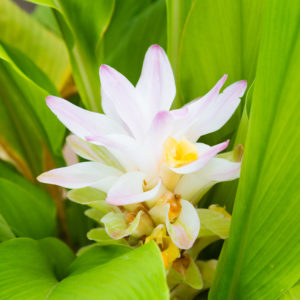
Turmeric is a perennial shrub native to southern Asia. It is a member of the ginger family (Zingiberaceae). And the Chinese name, jianghuang, literally means “yellow ginger.”
Most of the turmeric we get is grown in India. But turmeric is also cultivated in China, Taiwan, Japan, Myanmar (Burma), Indonesia and throughout Africa.
The primary chemical component in turmeric are a group of compounds called curcuminoids, which include curcumin (diferuloylmethane), desmethoxycurcumin, and bisdemethoxycurcumin. The best studied is curcumin which I’ll make reference to throughout this post on turmeric.
Turmeric also contains other important volatile oils including a- and b-turmerone, ar-turmerone, a-curcumen, and zingiberene. Some of which will also be referenced in this post.
Turmeric works on a molecular level to enhance neurogenesis. It boosts the neurotransmitters serotonin and dopamine. And is a powerful antioxidant helping to protect your brain from chronic, excess inflammation.
Turmeric is also used to treat digestive disorders, skin conditions, cancer, diabetes, heart disease, obesity, liver function, protect from damage to DNA, and treat chest and abdominal pain.
Here we’re going to explore how Turmeric benefits your brain.
Turmeric helps:
- Brain-Derived Neurotrophic Factor (BDNF): Research shows that the curcumin in turmeric boosts neurogenesis. The production of new neurons in your hippocampus is essential for learning, memory and mood. Low BDNF can lead to major depression, OCD, schizophrenia, and dementia.
- Neurotransmitters: The curcumin in turmeric boosts the feel good neurotransmitters serotonin and dopamine. These neurotransmitters are critical for mood, cognition, libido and focus. Curcumin functions very much like antidepressant MAOI’s and SSRI’s used to treat depression and Alzheimer’s Disease. Curcumin can actually enhance the effect of antidepressants like Prozac and Effexor.
- Neuroprotection: The curcumin in turmeric is a potent antioxidant and helps protect your brain from inflammation. Chronic inflammation has been linked to depression and dementia. Curcumin also reduces the formation of plaques that are associated with Alzheimer’s Disease.
Overview
Turmeric (Curcuma longa) is one of the most powerful natural remedies in Ayurvedic and Chinese medicine. This ancient herbal remedy has been used for at least 6,000 years.[i]
The major constituent of turmeric is curcumin (diferuloylmethane), which constitutes up to 90% of total curcuminoid content, with desmethoxycurcumin and bisdemethoxycurcumin comprising the remainder.
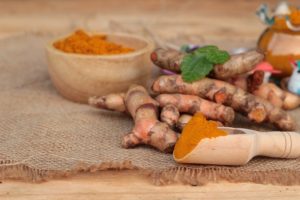
Turmeric is used extensively in several countries as part of their system of national medicine. Turmeric is listed in the official Ayurvedic Pharmacopoeia of India. In the Pharmacopoeia of the People’s Republic of China. In the Japanese Herbal Medicines Codex.
In Germany, turmeric is listed in the Drug Codex, approved in the Commission E monographs, and in the form of tea in the official German Standard License monographs.
Curcumin and turmeric have been extensively researched for their anti-tumor, antioxidant, anti-inflammatory and analgesic (pain-relieving) properties. In fact, a search of the U.S. PubMed database for research on turmeric returns 5,334 clinical trials on animals and humans.[ii]
And yet the National Center for Complementary and Integrative Health which is part of the same U.S. National Institutes of Health has this to say about turmeric:
“There is little reliable evidence to support the use of turmeric for any health condition because few clinical trials have been conducted.”[iii]
That statement by an official medical resource in the USA tells you something about the American health care system. And its view of alternative medicines. And why sites like Nootropics Expert® is so important for our nootropics community. So we can make our own decisions on how to boost our cognitive health.
Turmeric, also known as “Indian Saffron”, has been used for thousands of years in traditional South Asian cuisine, and is the basic ingredient in curry.
One recent study with 1,010 elderly Asian subjects found that those who ate curry “often” or “very often” had significantly higher cognitive performance.[iv]
Turmeric has potent antidepressant qualities. And has been found to be more potent than the antidepressant Prozac. Researchers think Turmeric works by reducing the stress hormone cortisol while increasing levels of the neurotransmitter serotonin.
Turmeric’s main active component curcumin provides protection against Alzheimer’s, major depression, epilepsy, and other neurodegenerative disorders. Scientists believe that much of this protective action comes from curcumin’s anti-inflammatory and antioxidant properties.
Curcumin modulates neurotransmitter levels in your brain. And on a molecular level is a potent inhibitor of reactive astrocyte expression which prevents apoptosis (cell death) in your brain.[v]
How does Turmeric Work in the Brain?
Turmeric boosts brain health and function in several ways. But two in particular stand out.
- Turmeric enhances neuroplasticity. Brain-Derived Neurotrophic Factor (BDNF) is a growth hormone responsible for the creation of new neurons (neurogenesis) in your brain. Higher levels of BDNF can increase mood, intelligence, memory and productivity. And can reduce risks for neurodegenerative diseases like Alzheimer’s and Parkinson’s.
Using turmeric or its active compound curcumin can boost your intelligence and memory. And can elevate your mood especially if you’re prone to depression. Several studies have shown that turmeric or its active component curcumin significantly boosts BDNF.[vi]
Researchers found that curcumin activated extracellular signal-regulated kinases (ERKs) and p38 kinases, cellular signal transduction pathways known to be involved in the regulation of neuronal plasticity and stress responses.
Administration of curcumin to mice in this study increased the number of newly generated cells in the hippocampus. Showing that curcumin enhances hippocampus neurogenesis. And that curcumin activity in the brain enhances neuroplasticity and repair of brain cells.[vii]
Another study using the turmeric volatile oil Ar-turmerone showed this compound also supported regeneration of brain cells. Scientists discovered that when neural stem cells were bathed in Ar-turmerone, up to 80% more stem cells grew into neurons or other cells.
Scientists then injected this turmeric extract into a part of rat’s brains where these cells are located. And witnessed a similar increase in growth of stem cells into neurons.[viii]
- Turmeric boosts dopamine and serotonin levels in the brain. These are the ‘feel good’ neurotransmitters in your brain. Turmeric and its active compound curcumin has been studied, and used effectively as an anti-depressant for centuries.
Researchers in India set out to establish how curcumin worked in the brain to provide this antidepressant action. In this study they investigated both curcumin and its ability to boost mood as well as the effect of Piperine as a bioavailability enhancer.
The scientists found that curcumin increased serotonin and dopamine levels in the brain. And inhibited monoamine oxidase enzymes (both MAO-A and MAO-B) just like popular prescription antidepressant MAOI’s. Curcumin even enhanced the effectiveness of popular SSRI antidepressants Prozac, Effexor, and Zyban.
The team found no increase in norepinephrine when using curcumin to boost neurotransmitters. Avoiding the irritability and other symptoms of an over-amped fight-or-flight response.
And the scientists found that stacking curcumin with Piperine significantly boosted bioavailability. They concluded that curcumin combined with Piperine was a “potent natural antidepressant approach to managing depression”.[ix]
How things go bad
Chronic stress, anxiety and free radicals (oxidation) damage your brain. This damage can manifest in several ways including memory loss, brain fog, anxiety, depression, and even neurodegenerative diseases like Alzheimer’s and Parkinson’s.
↓ Chronic stress reduces memory
↓ Toxins kill brain cells
↓ Free radicals destroy neurons and synapses
↓ Serotonin and dopamine decline
↓ Brain-Derived Neurotrophic Factor declines
Under conditions of chronic stress or depression your brain loses the capacity to transmit signals between neurons efficiently. Memory, cognition and decision-making all suffer as a result.
Turmeric benefits
A member of the ginger family of herbs, turmeric is the seasoning that gives curry powder its yellow color. It’s long been known for its anti-inflammatory and antioxidant properties. And is actively studied today for applications as a nootropic.
Turmeric or anyone of its several active compounds including curcumin and Ar-turmerone undoes damage to your brain caused by depression or chronic stress.
Turmeric and curcumin boosts neuron regrowth (neurogenesis), increases dendrites, repairs DNA, reduces inflammation, counters free radical damage, and boosts neurotransmitters.
Turmeric inhibits monoamine oxidase enzymes (both MAO-A and MAO-B) just like popular prescription antidepressant SSRI’s and MAOI’s. Research shows that curcumin or turmeric can boost the effects of some popular antidepressants.
Boosting the ‘feel-good’ neurotransmitters serotonin and dopamine can alleviate depression, improve mood, boost alertness, cognition, decision-making, memory and even libido.
Curcumin, the most active component of turmeric, activates genes to produce a huge array of antioxidants that serve to protect your mitochondria.
Curcumin also improves glucose metabolism, which is great for maintaining a healthy balance of gut bacteria. This critical microbiome in your gut directly influences how well your brain functions.
How does Turmeric feel?
Curcumin is the main active component of turmeric. So most of the positive reviews and studies have been conducted using curcumin.
Curcumin is known to possess antimicrobial, anti-inflammatory, anti-hypertensive, anti-hyperlipidemic, anti-tumor, anti-cancer, anti-phlogistic, anti-diabetic, anti-psoriasis, anti-thrombotic, anti-hepatotoxic and a host of other useful properties.
If you are in perfect physical and mental health you may not feel the effects of supplementing with turmeric or curcumin. Turmeric’s neuroprotective qualities may not be felt if your brain is in perfect working order. But the effects of long-term supplementation will help you ward off diseases like Alzheimer’s and Parkinson’s.
The most frequent comment from supplementing with turmeric comes from those dealing with chronic pain. Turmeric relieves the pain of osteoarthritis and fibromyalgia.
Chronic pain usually results in insomnia or poor sleep quality, loss of memory, depression, and other stress-related symptoms. Adding curcumin or turmeric to your nootropic stack can help relieve chronic pain. You’ll sleep better and feel more alert the next day.
Supplementing with turmeric or curcumin improves attention, working memory, and mood. And is reported to relieve the symptoms of migraine headaches.
Turmeric Clinical Research
Eat Your Curry
Curcumin, from the curry spice turmeric, has been shown to have antioxidant and anti-inflammatory properties. And can reduce beta-amyloid plaques that are associated with Alzheimer’s Disease. But scientists were not satisfied with the evidence of turmeric’s benefits in real life.
So in 2003, a research team in Singapore recruited 1,010 non-demented elderly Asian people aged 60 – 93 years. The authors of the study compared Mini-Mental State Examination (MMSE) scores for three categories and regular curry consumption.
The scientist found that those who consumed curry “occasionally” and “often or very often” had much higher MMSE scores than those who “never or rarely” consumed curry.
The study authors reported that regular curry consumption was evidence of better cognitive performance. The bottom-line → eat your curry.[x]
Turmeric as an anti-depressant
A study conducted in India looked at the efficacy and safety of using curcumin, one of the active ingredients found in turmeric, for treating major depression.
60 patients diagnosed with major depressive disorder were chosen to receive either 20 mg of fluoxetine (Prozac®), 1000 mg of curcumin, or a combination of both daily for 6 weeks.
The study found that the best response (77.8%) was with the group of patients treated with a combination of curcumin and Prozac. The Prozac only group experienced a 64.7% improvement in depression symptoms. And the curcumin only group came in at 62.5%.
The researchers concluded that curcumin could be used as an effective and safe treatment for patients with major depression.[xi]
Curcumin Reduces Stress
Turmeric has long been used in traditional Chinese medicine to manage stress and depression-related disorders. Scientists had already figured out turmeric’s antidepressant effects in animal and human studies. So they imagined that curcumin may also alleviate stress caused by HPA (hypothalamic-pituitary-adrenal) dysfunction.
For this study the scientists used rats. They subjected the animals to stress for 20 days by putting them through several tasks known to stress a rat.
Putting rats through this unfortunate (for the rats) series of events produced the kind of symptoms you would see in humans subjected to ongoing, chronic stress.
The rats had abnormal adrenal gland weight, increased thickness in the adrenal cortex, elevated cortisol levels, and reduced glucocorticoid receptor (GR) mRNA expression. These changes were reversed by giving the rats curcumin in their food.
The research team also found that chronic stress down-regulated BDNF levels, and reduced the ratio of cAMP to CREB levels in the hippocampus and frontal cortex of the rats. Giving the rats curcumin blocked all these stress-induced physical responses in their brains.
The scientists concluded that these results provided compelling evidence that the behavioral effects of curcumin in chronically stressed animals, and by extension humans, could be related to the modulating effects of curcumin on the HPA axis and neurotrophin expressions.[xii]
Turmeric Dosage
You cannot get the immediate therapeutic and nootropic benefits of turmeric by simply eating more curry. Or adding turmeric to your food. Turmeric root contains only about 3% curcumin.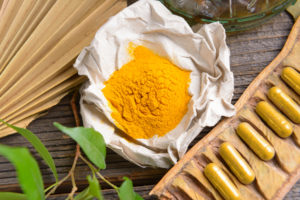
The most convenient way to start experiencing the benefits of turmeric is to get a high quality, 100% organic turmeric extract that contains at least 95% curcuminoids.
But curcumin and turmeric on their own are poorly absorbed by your gut. You must boost the bioavailability and absorption of this potent nootropic.
And the most efficient way to boost bioavailability is to combine turmeric or curcumin with Piperine. One study showed combining curcumin with 20 mg of Piperine increased bioavailability by 2000%![xiii]
Turmeric is fat-soluble so you must take it with a high quality fat for maximum absorption. You can use organic, cold-pressed coconut or olive oil.
Standardized turmeric or curcumin extract (95% curcuminoids) 750 mg 3-times per day.
Turmeric liquid extract (1:1) 30 – 90 drops per day.
Tincture (1:2) 15 – 30 drops 4-times per day.
Dried turmeric root powder 2.5 – 4 grams per day.
Turmeric Side Effects
Turmeric is natural and considered non-toxic and safe when taken at recommended doses.
Taking large amounts of turmeric for extended periods can cause stomach upset, and possibly ulcers.
If you have gallstones or obstruction to your bile passages you should not supplement with turmeric.
Turmeric may lower blood sugar levels which could be a problem for diabetics.
Pregnant and breastfeeding women should not supplement with turmeric.
If you are dealing with kidney disease you should avoid using Turmeric or Curcumin.
And because turmeric can act as a blood thinner, stop supplementing with turmeric 2 weeks before surgery. Turmeric can also strengthen the effects of blood thinning medications.
Make sure you are using a high quality Turmeric or Curcumin extract supplement that is pure. There are been several reports of high lead content in powdered or raw Turmeric. One report showed an elderly man had to redo his MRI for prostate cancer because the Curcumin supplement he was using interfered with the imaging result.
Types of Turmeric to Buy
Turmeric is available as a powder, tablets, capsules, tincture and tea. And is preferred over curcumin if you’re using it for inflammatory conditions like arthritis, tendonitis, or an autoimmune condition.
Curcumin is a natural chemical found in, and extracted from turmeric. Several companies have developed their own version of this powerful nootropic.
Sabinsa’s Curcumin C3 Complex® boasts the most clinical studies of any of the patented forms of curcumin. This curcumin product is standardized to 95% Curcuminoids. Sabinsa also produces the standardized Piperine extract called BioPerine®. And supplement makers who feature Curcumin C3 Complex® from Sabinsa also typically include BioPerine® in their formula.
BCM95® by DolCas Biotech is a standardized extract of turmeric containing curcumin-essential oil complex of 86% curcuminoids and 7-9% essential oils. As far as I can tell this is the only extract that includes turmeric volatile oils which is important to cognitive health. Recall from earlier in this article that turmeric volatile oil Ar-turmerone supported regeneration of brain cells
Longvida® is a standardized curcumin extract that the company claims is at least 67-285 times more bioavailable than standard 95% curcumin. But does not contain any of the volatile oils found in natural turmeric. One study showed that this extract increases synapses in mice.[xiv] Another study in humans showed Longvida® significantly improved attention, working memory, and mood compared to placebo.[xv]
Meriva® is another patented form of curcumin combined with soy lecithin. The two compounds are a 1:2 ratio with microcrystalline cellulose added. The company claims that the addition of soy lecithin improves bioavailability of curcumin. Total curcumin in each capsule is 20%. Much higher doses of this curcumin extract are needed for optimizing cognition. And is primarily targeted at bone, joint, eye and skin health.
Active ingredients of Turmeric include curcuminoids and volatile oils. Look for the percentage of active ingredients listed on the bottle or package. Your best option is choosing a standardized extract of at least 95% curcuminoids.
Unless the supplement contains a patented compound from the companies listed above, you can assume that the extract has been processed using toxic solvents to extract curcumin from turmeric (not good).
And avoid supplements that list “other ingredients” on the label. Look for Certified Organic to ensure the root used to make your Turmeric supplement is free of heavy metals, pesticides and herbicides.
Nootropics Expert Recommendation
Turmeric Extract (95% curcuminoids) 750 mg 3-times per day
 I recommend using Turmeric or Curcumin as a nootropic supplement.
I recommend using Turmeric or Curcumin as a nootropic supplement.
Your body does not make Turmeric on its own. So to get its benefits you must take it as a supplement.
Turmeric is the anti-Alzheimer’s spice. Studies show that in parts of India where curries are eaten most often, Alzheimer’s disease is extremely rare.
Turmeric is especially helpful for those suffering from depression or chronic pain.
Turmeric has a combination of curcuminoids, volatile oils and proteins that make it anti-bacterial, anti-cancer, anti-inflammatory, and anti-septic.
Some neurohackers maintain that turmeric or curcumin is the best nootropic. You can increase the bioavailability of turmeric by combining it with Piperine (black pepper extract) and a healthy fat like olive or coconut oil.
You can safely take up to 3,000 mg of Turmeric extract daily if needed. Most get all the benefit they need with 750 mg. Dosed 3-times per day.

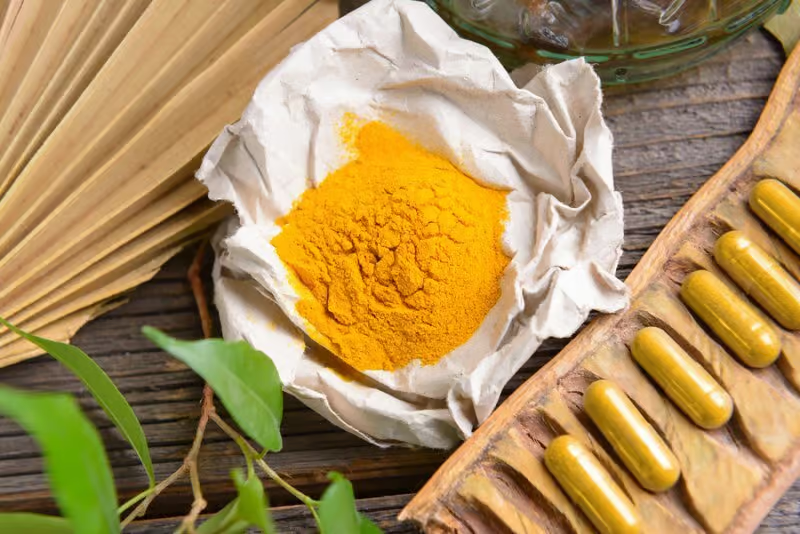
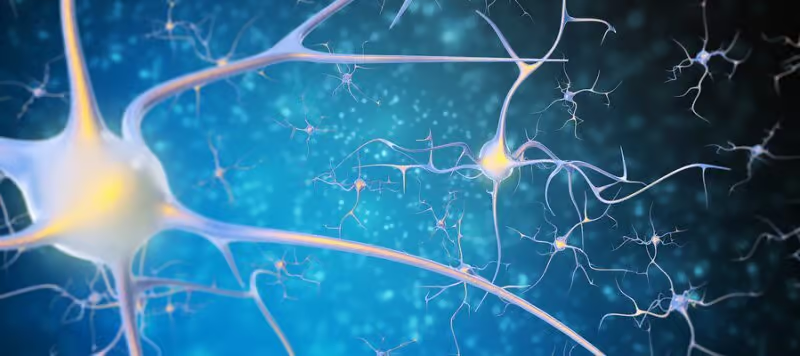






Join The Discussion - 249 comments
Dalila
November 10, 2024
My daughter is on ketogenic diet to control her seizures. No Medecine. Is there any contraindications of taking all three at the same time?
One capsule of 500mg Curcumin
One capsule of 350mg Resveratrol
One capsule of 350mg of AC-11
David Tomen
November 11, 2024
Dalila, none of those supplements are contraindicated. Have you considered trying CBD Oil to reduce seizures?
Dalila
November 11, 2024
Yes David, we tried CBD. It worked at the beginning but after few months on CBD she started to have more seizure. So, we weaned the CBD. I am seeing some improvements with Tumeric + Resveratrol + AC-11 , no seizure and more alert however, I am worried about blood thinning effect and serotonin syndrome? She is on ketogenic diet and her only source of fat is extra virgin organic olive oil ( which has vitamin k) .
David Tomen
November 12, 2024
Serotonin Syndrome is only a problem when trying to combine a drug with another drug that affects serotonin. Or a drug with a supplement that affects serotonin. No two nootropics can cause Serotonin Syndrome.
The blood thinning effect should not be a problem unless she is about to have surgery. What I worry about are restricted diets and nutrient deficiencies. The best insurance against that is a BioActive Multivitamin.
Andrew Richardson
October 30, 2024
Is it safe to take curcumin while I’m on lamotrigine? I’m using lamotrigine off-label for OCD, not bipolar disorder. I also on rare occasion take zopiclone to help with insomnia when it becomes a problem.
i take 400MG of curcumin curamed once a day when i get up, would this be out my system 12hour later if i need the sleeping pill
David Tomen
October 30, 2024
Andrew, neither drug is contraindicated with Curcumin.
Andrew Richardson
October 30, 2024
one more question, I take Curamed Curcumin with is bio-95 BCM95
should i still add black pepper to this to make it even better!
David Tomen
November 1, 2024
Andrew, absolutely add 10 mg Piperine or BioPerine because it will increase the effects of BCM-05 dramatically. The human body does not want to digest and absorb Curcumin or Turmeric but using Piperine solves that problem.
Marianne
July 20, 2024
Hello David, I will be taking Saffron extract (Affron) 1 capsule 30 mg per day. Could I take Curcumin Longview SLCP extract 400 mg per day as well?
I have moderate depression and do not want to take SSRIs anymore, I already have withdrawn from Sertraline since 3 weeks.
Also I have had COVID-19 and lost my sense of smell for 7 weeks, that is fine now. The curcumin I would like to take to try to eliminate the inflammation in my brain which was a result of Covid.
Thank you so much for all your hard work and good advice!
David Tomen
July 23, 2024
Marianne, you should have no problem using both supplements. Just follow dosage recommendations for each.
James Pickett
June 7, 2024
Hi David,
I’m taking Brintellix 20mg a antidepressant, think its ok to take curcumin?
David Tomen
June 10, 2024
James, Curcumin is likely going to make Brintellix work better. It did in other studies combining Curcumin with other SSRIs.
Szilvia
May 1, 2024
Dear David, I apologize for so many questions! Can the modern, new type of turmeric, the new generation of liposomal and similar colloid technologies, CurQfen®, be taken together with St. John’s wort?
I know that saffron cannot be taken with St. John’s wort because of the risk of serotonin syndrome, so does turmeric also interact with St. John’s wort?
Thank you for your help!
David Tomen
May 8, 2024
Good question and you need to be careful because Curcumin is a potent MAOI. Which can cause problems when used with St. John’s wort.